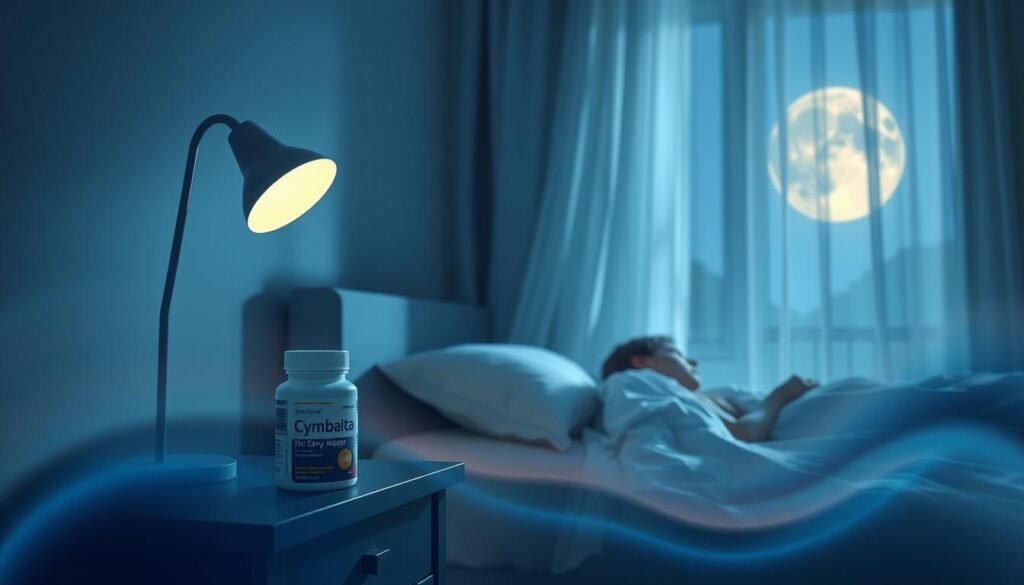Almost 15% of U.S. adults have felt mild to severe anxiety recently. This anxiety often comes hand in hand with insomnia. It shows a strong connection between not sleeping well and mental health issues. Cymbalta is mainly used for depression and anxiety but also helps with insomnia. Yet, starting Cymbalta might lead to a week of sleepless nights for some. This piece will explore how to get better sleep with Cymbalta through proper adjustments.
Key Takeaways
- Many beginners of Cymbalta may face initial sleep difficulties, but adjustments can help.
- Cymbalta’s classification as an SNRI can provide uplifting effects on mental health.
- Consultation with healthcare providers can facilitate effective insomnia treatment options.
- Complementary approaches, including CBT, can enhance sleep quality while on Cymbalta.
- Awareness of potential side effects, including insomnia, is crucial for patients.
Understanding Insomnia and Its Symptoms
Insomnia is a common sleep issue that many people face. It makes getting to sleep and staying asleep hard. Knowing about insomnia is key for anyone looking for relief. We’ll cover what insomnia is, its main symptoms, and how it affects daily life here.
What is Insomnia?
Insomnia means having trouble falling or staying asleep, which leads to poor sleep quality. It can show up as trouble starting to sleep, waking up often during the night, or waking up too early and not getting back to sleep. Those with insomnia may find it impacts their daily activities negatively.
Common Symptoms of Insomnia
- Difficulty falling asleep: Often due to overthinking or anxiety.
- Frequent awakenings: Waking up often during the night.
- Waking up too early: And having trouble falling back asleep.
- Tiredness upon waking: Not feeling rested after sleeping.
- Daytime fatigue: Feeling sleepy and low on energy during the day.
Impact of Insomnia on Daily Life
Insomnia’s effects reach beyond just sleeping issues. It can greatly affect day-to-day life. People might experience:
- Concentration difficulties: Sleep loss can harm focus and attention.
- Increased irritability: It often leads to feeling moody or stressed.
- Health issues: Long-term insomnia can cause many health problems, like weakened immune function and more stress.
Understanding the symptoms of insomnia and how they affect life is crucial. It helps those looking for treatments. Knowing these details helps pinpoint the best strategies for relief that suit individual needs.
How Cymbalta Works
Cymbalta, also known as duloxetine, treats conditions like major depressive disorder and anxiety. It’s vital to understand how it works for those considering treating insomnia with Cymbalta. Classified as an SNRI, it impacts brain neurotransmitters.
Classification of Cymbalta as an SNRI
Cymbalta is an SNRI. It works by keeping serotonin and norepinephrine in the brain longer. This can improve mood and lower anxiety. But, it may cause sleep disturbances, such as insomnia or fatigue.
Effects of Cymbalta on Neurotransmitters
Cymbalta’s interaction with neurotransmitters is key to its side effects. Higher serotonin levels can stabilize mood but disrupt sleep for some. Studies show it affects sleep quality and REM sleep, vital for rest. Over 10% of users report insomnia, complicating health management. It’s crucial to discuss sleep issues with healthcare providers while on Cymbalta.

To learn more about Cymbalta’s breadth and impact, it’s wise to seek reliable information. Checking out Cymbalta’s prescribing information is a good start. It details uses and risks. Learning how to handle cymbalta and sleep disturbances is also important for those facing such challenges.
Insomnia Cymbalta: Managing Sleep Disturbances
Cymbalta and sleep have a complex relationship. This medication helps with many conditions but might cause sleep problems, like insomnia. Knowing about these side effects can help users deal with them better.
Potential Insomnia Side Effects from Cymbalta
Starting Cymbalta may make some people have trouble sleeping for a few days up to a week. It’s because the drug increases serotonin and norepinephrine levels, affecting sleep. You might find it hard to fall asleep, wake up often during the night, or feel tired in the morning.
- Difficulty falling asleep
- Frequent awakenings during the night
- Waking up unrefreshed
If sleep issues don’t go away, adjusting the dose might help. Although Cymbalta is more energizing than sleep-inducing, finding the right dosage with your doctor is key.
Factors Contributing to Sleep Issues with Cymbalta
Several things can make sleep problems worse with Cymbalta. How you react to the medication varies and can influence sleep. Mixing it with meds or supplements like St. John’s Wort or Ashwagandha might also lead to more sleep troubles and serotonin syndrome.
When insomnia really affects your life, you might consider other ways to handle it. Options include prescription sleep aids such as Zolpidem and Trazodone. Or trying Cognitive Behavioral Therapy for Insomnia (CBT-I), which can work without more drugs.
- Prescription sleep medications like Zolpidem and Trazodone
- Cognitive Behavioral Therapy for Insomnia (CBT-I), which has proven effective without additional medications
Talk with your healthcare provider to figure out the best way to manage insomnia from Cymbalta.
Adjusting Cymbalta for Better Sleep
Finding the right Cymbalta dosage can greatly improve insomnia management. It’s crucial to understand how dosage adjustments and timing can affect sleep. This leads to better sleep for those facing these challenges.
Dosage Adjustments for Insomnia Management
About 10% of Cymbalta users report insomnia as a side effect. Symptoms include trouble falling asleep and waking up too early. For some, reducing the dosage can help manage insomnia. Balancing mental health with sleep quality is vital. Those with ongoing sleep issues should talk to their doctors about dosage changes.
The Importance of Timing in Cymbalta Administration
When you take Cymbalta can deeply affect sleep. Taking it at certain times can enhance sleep quality. A consistent schedule helps reduce sleep problems. It’s usually best to take Cymbalta in the morning to avoid insomnia. If sleep issues do persist, talking to a doctor about using melatonin might help. Timing Cymbalta right can improve its benefits and reduce sleep-related anxiety and depression.

Complementary Approaches to Treating Insomnia
Exploring different treatments for insomnia can lead to better sleep. People often add other meds to their use of Cymbalta. This includes trazodone and melatonin, which may help with insomnia.
Alternative Medications to Improve Sleep
Trazodone is not just for depression. It can also help you sleep because of its calming effect. Melatonin helps control when you sleep and wake up. Together with Cymbalta, they offer more ways to fight insomnia and get quality sleep.
Non-Pharmacological Treatment Options
There are other ways to tackle insomnia without medication. One effective method is Cognitive Behavioral Therapy for Insomnia (CBT-I). It looks at and changes thoughts and actions that ruin sleep.
Adding mindfulness, relaxation, and exercise to your routine can also improve sleep. These steps make a big difference in sleep quality and overall health.
If you’re seeking drug-free treatments, check out the Alternative to Meds Center. They’ve spent years using non-medicinal methods to deal with psychiatric conditions. They focus on reducing side effects of medications.

Cymbalta and Sleep: What the Research Says
Understanding how Cymbalta affects sleep is key for managing insomnia well. Some find better sleep quality, while others may face worse insomnia. This shows how the medication’s effect can vary greatly from person to person.
Clinical Studies on Cymbalta’s Effects on Sleep
Research shows many on antidepressants struggle with sleep. Those on SNRIs like Cymbalta face a higher risk of REM sleep issues. One study found 12.2% on such meds had problems. A specific example noted a patient on Cymbalta had a 29.5% increase in REM sleep movement.
Understanding Treatment-Emergent Adverse Events
It’s vital to watch for sleep issues when taking Cymbalta. Symptoms like insomnia can pop up after stopping the drug suddenly. That’s why stopping slowly, with a doctor’s help, is important. People report different side effects, from trouble sleeping to more anxiety. This makes regular talks with healthcare providers crucial for handling sleep problems while on Cymbalta.
Cymbalta Side Effects Related to Insomnia
Cymbalta is used to treat various conditions but can cause side effects. Insomnia is a major concern for users. Knowing about these effects can help in managing your treatment.
Common Side Effects Experienced by Users
Users of Cymbalta might face several side effects. They vary in how severe they are. Some of the mild side effects are:
- Sleepiness
- Fatigue
- Nausea
- Dry mouth
- Constipation
- Reduced appetite
- Dizziness
- Headache
- Sweating
- Insomnia
Users may experience sleep issues due to Cymbalta. This can make falling or staying asleep hard. It’s important to watch how long these effects last.
Long-term Side Effects and Considerations
Using Cymbalta for a long time may lead to serious side effects. These serious effects include:
- Liver damage
- Suicidal behaviors
- Eye problems
- Severe allergic reactions
- Blood pressure changes
- Serotonin syndrome
- Low sodium levels
- Urination problems
- Severe skin reactions
- Unusual bleeding or bruising
It’s key for patients on Cymbalta for a while to talk regularly with their doctors. They should check for liver issues or any suicidal thoughts. Recognizing these serious issues early is critical.
Cymbalta can help many people, but those with insomnia or sleep problems should be extra careful. Staying in touch with healthcare providers is crucial to handle the treatment well.
How to Discuss Cymbalta and Sleep Issues with Your Provider
When you’re dealing with insomnia on Cymbalta, talking openly with your doctor is crucial. Discussing sleep problems helps find better solutions to enhance sleep and well-being. Getting ready for these talks can greatly improve the results.
Preparing for Your Appointment
It’s smart to track your sleep and medication before the visit. A sleep diary pinpoints how Cymbalta affects your sleep. This info leads to a more informed chat and personalized advice from your doctor.
- Sleep duration and quality
- Fluctuations in mood or energy
- Daily activities impacting sleep
Questions to Ask Your Psychiatric Provider
Asking the right questions is key to dealing with insomnia. Think about these important points:
- Could changing my Cymbalta dose help me sleep better?
- Are there other medicines that could ease my insomnia?
- Could non-drug treatments like cognitive behavioral therapy (CBT-I) help?
- Might the timing of my Cymbalta dose affect my sleep?
Ready and thoughtful planning for your visit can lead to a productive discussion. Together with your doctor, you can improve how you manage sleep issues. To learn more about talking to your doctor about sleep, check out this useful guide.
Conclusion
Handling sleep issues while on Cymbalta presents unique challenges. It’s important to know how the medication affects sleep. Talking openly with healthcare providers about managing symptoms can help. This might include changing the dosage and looking at other treatment options to improve sleep quality.
Cymbalta is approved by the FDA for treating several mental health issues. It’s proven to be safe and effective. Studies show taking 80 to 120 mg/day helps those with major depressive disorder. They see better scores in key symptoms over time. For more details, visit this study.
To get better sleep while handling conditions like anxiety and depression, a wide-ranging approach is needed. Creating a strong support network and getting personalized advice from doctors is key. This helps improve overall well-being significantly.